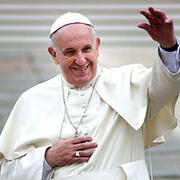
On August 2, the Vatican announced a change in the Catechism of the Catholic Church’s teaching on the death penalty. The new teaching rejects the notion that capital punishment is legitimate in some cases, declaring that “‘the death penalty is inadmissible because it is an attack on the inviolability and dignity of the person,’ and [the Church] works with determination for its abolition worldwide.”
HDS communications reached out to Francis Schüssler Fiorenza, Charles Chauncey Stillman Professor of Roman Catholic Theological Studies, for insight about the history the Catholic Church’s teaching on the death penalty and how the change will be expressed in local parishes.
HDS: How has the Roman Catholic Church's teaching on the death penalty developed over time?
Francis Fiorenza: In the past, the Church, or more precisely, the teaching of the tradition as represented by leading figures, such as St. Augustine or St. Thomas Aquinas, tended to view the death penalty as a justified killing. They based this on a natural law argument and saw the death penalty as a preventive deterrence and as an example of retributive justice belonging to the rulers who had an obligation to protect its citizens. Biblical quotations from the Hebrew as well as Christian scriptures would be cited to justify this position. The view is enduring from antiquity to modernity and was reflected in the Catechism of the Council of Trent as well in papal teaching. The post-Vatican II Catholic Catechism marks a shift.
HDS: What prompted this change? Would it have happened if another Pope were in place instead of Pope Francis?
Fiorenza: The change started to take place in the wake of World War II. Aware of the political executions by the Nazi regime in Germany, as well as in other totalitarian regimes, political and theological criticisms of the death penalty started to emerge. The constitution of West Germany that was passed in May 1949 forbids capital punishment. The Italian constitution approved in 1947 eliminated the death penalty. Spain abolished the death penalty in 1930. It was reintroduced by General Franco, but in 1978, the Spanish constitution outlawed the death penalty even during war time.
In the 1950s, the Council of Europe passed what is now called the European Convention on Human Rights. Protocol 13 called for the complete abolition of the death penalty. All but three member states have ratified this provision. Amnesty International reported in 2015 that 101 countries worldwide had abolished the death penalty. It also asserted that 140 have de facto eliminated it.
I think these developments are socially and culturally significant and need to be taken into account. Just as many countries have much more restrictive attitudes toward gun possession in public than the United States, so too are many countries much more restrictive in regard to the death penalty than the United States. The cultural awareness that leads to the abolition of the death penalty has therefore had an impact upon religious and theological reflection.
In the United States, Cardinal Joseph Bernardin of Chicago maintained a “consistent life ethic” from conception to death and argued against the death penalty. More directly influential on Pope Francis is the teaching Pope John Paul II, who argued that the death penalty is cruel and unnecessary and appealed for its elimination. (He has proposed that incarceration should be preferred.) However, in 1995 he argued that the death penalty should be avoided except in cases of absolute necessity to defend society. But, as he later argued, these cases are practically non-existent.
HDS: How significant is this change to the Catechism's teaching?
Fiorenza: Pope Francis’s change is not a major change. The Catechism allows the death penalty in certain circumstances. But it further argues that other means to defend the people from unjust aggressors should be preferred over the death penalty. They respect human dignity. Moreover, they are in accord with the common good because other effective means exist to prevent crime. The Catechism then quotes Pope John Paul II, “the cases in which execution of the offender is an absolute necessity are very rare, if not practically nonexistent.” What Pope Francis has done has mainly strengthened the points made by Pope John II and made the condemnation more absolute.
HDS: How will this impact or translate in local parishes? What will this mean for priests? For followers?
Fiorenza: Pope Francis’s teaching should lead local parishes, especially in the United States, to educate people about the change that has taken place in many nations and the reasons for the change or development of Roman Catholic teaching. A significant portion of Roman Catholics are descendants from immigrants from different European Catholics. The development of Catholic teaching has taken place in various ways throughout the centuries. It might be important for priests to remind the local parishes of these changes and how increasing development of the opposition to the death penalty is a way of the Church’s expressing its affirmation of human dignity.